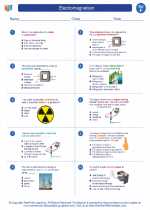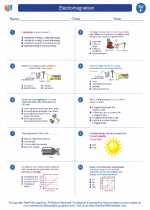Ecosystems
An ecosystem is a community of living organisms (plants, animals, and microorganisms) in conjunction with the nonliving components of their environment (such as air, water, and mineral soil), interacting as a system. These biotic and abiotic components are linked together through nutrient cycles and energy flows.
Components of an Ecosystem
Ecosystems consist of two main components:
- Abiotic factors: These are the non-living components of the ecosystem, such as soil, water, air, sunlight, temperature, and minerals.
- Biotic factors: These are the living components of the ecosystem, including plants, animals, and microorganisms.
Types of Ecosystems
Ecosystems can be classified into various types based on their characteristics:
- Terrestrial ecosystems: These are ecosystems found on land, such as forests, grasslands, deserts, and tundra.
- Aquatic ecosystems: These are ecosystems found in water, including freshwater ecosystems (lakes, rivers) and marine ecosystems (oceans, coral reefs).
- Human-made ecosystems: These are ecosystems that have been modified or created by humans, such as agricultural fields, urban areas, and gardens.
Energy Flow in Ecosystems
The flow of energy in an ecosystem follows a specific pathway:
- Producers: These are organisms (usually plants) that can produce their own food through photosynthesis, converting sunlight into chemical energy.
- Consumers: These are organisms that obtain energy by consuming other organisms. They can be herbivores (plant eaters), carnivores (meat eaters), or omnivores (both plant and meat eaters).
- Decomposers: These are organisms that break down dead organic matter and release nutrients back into the ecosystem, completing the nutrient cycle.
Importance of Ecosystems
Ecosystems are essential for the survival of all living organisms, including humans, as they provide vital services such as oxygen production, carbon sequestration, water purification, and food resources. Understanding and preserving ecosystems is crucial for maintaining biodiversity and sustaining life on Earth.
Study Guide
Here are some key points to remember when studying ecosystems:
- Define the term "ecosystem" and explain its components.
- Identify and describe different types of ecosystems, providing examples of each.
- Explain the flow of energy in an ecosystem, including the roles of producers, consumers, and decomposers.
- Discuss the importance of ecosystems and their impact on the environment and human well-being.
[Ecosystems] Related Worksheets and Study Guides:
.◂Science Worksheets and Study Guides Sixth Grade. Electromagnetism

 Activity Lesson
Activity Lesson
 Worksheet/Answer key
Worksheet/Answer key
 Worksheet/Answer key
Worksheet/Answer key
 Worksheet/Answer key
Worksheet/Answer key
 Vocabulary/Answer key
Vocabulary/Answer key
 Vocabulary/Answer key
Vocabulary/Answer key
